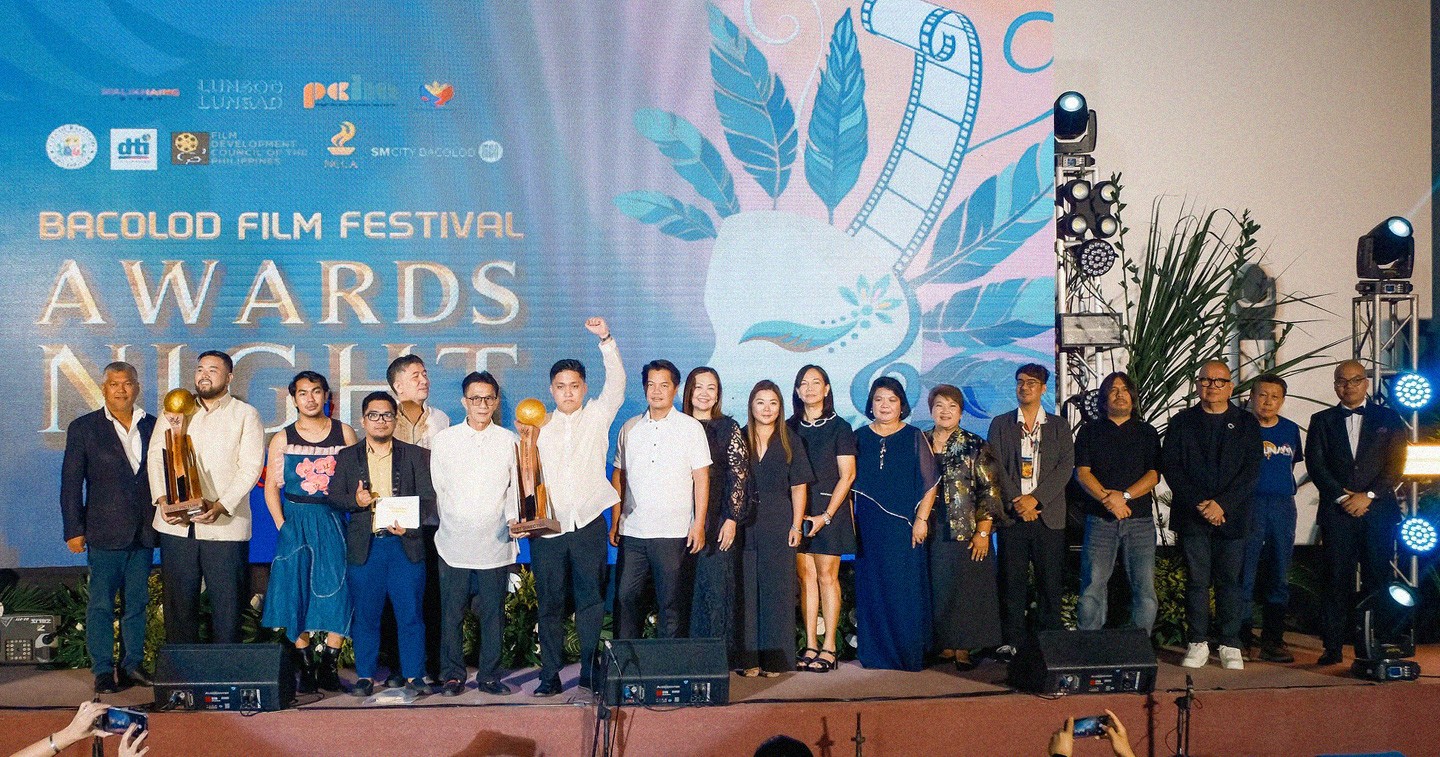BACOLOD, PHILIPPINES — The Bacolod Film Festival made history with Sa Pwesto ni Pistong emerging as the night’s biggest winner, claiming the prestigious awards for Best Picture, Best Director, and Best Screenplay. The film was also nominated for Best Musical Score, cementing its place as a standout in the festival’s inaugural edition.
Directed by VinJo Entuna, Sa Pwesto ni Pistong is a short period film set during Martial Law, honoring the victims of the Escalante Massacre — an event to be commemorated every September 20. The film pays homage to the victims and survivors of this dark period in Philippine history, highlighting their struggles and the ongoing fight for justice.
Shot in just one day, the film’s barbershop setting serves as a symbolic stage, reflecting the roots of Bacolod cinema in theatre. What makes the film stand out is its technique: each sequence is captured in a single, uninterrupted long take, leaving no room for cuts. This bold choice required precision from the cast and production team, most of whom have rich theatre backgrounds, led by Nonilon Torpez in the lead role.
The one-locked camera angle amplifies the sense of oppression and voyeurism while subverting the classical Hollywood formula that has long influenced Bacolod cinema. The film’s stylistic choices testify that storytelling should transcend aesthetics and be rooted in substance. This treatment, both a homage and a subversion, aims to connect intimately with audiences, evoking the warmth of human experience.
The musical score also paid homage to Bacolod, featuring a cinematic rendition of the city’s official hymn, “Kami Tumandok,” further embedding the film in the local cultural landscape.




During his acceptance speech, director VinJo Entuna delivered a heartfelt message:
“Maayong aga, ugto kag gabi. Tingba niyo nalang kay laka malang ko mag speech sa inyo tanan. Ako si VinJo Entuna, direktor sang Sa Pwesto ni Pistong. Gusto ko lang magpasalamat kay Mayor Albee, Councilor Em Ang, Dr. Frances Llamas, BFF management team headed by Sir Seymour Sanchez, kag sa aton mga siomai. Ukon sa English, ‘esteemed guests.’
Ugaling, gusto ko man hatagan special na pagkilala kag pagpapasalamat sa mga tumandok nga taxpayers sang Bacolod.
For so long, Bacolod cinema has been monopolized by the stories of the elites, particularly those of the hacendero class and the glorified, exploitative hacienda system that has been one of the root causes of social unrest in Negros and the Philippines.
With the help of our representatives, we were given an avenue to give voice to the voiceless, to showcase the stories of struggle by the working class.
This was manifested in the entries shown – from stall owners displaced by a huge developer, a coffee shop struggling with rapid commercialization, a photographer struggling to keep up with the advent of technology, a blue-collar bank employee struggling for social acceptance, to a barber affected by the oppression of Martial Law.
In my context with Sa Pwesto ni Pistong, I don’t want you to remember me as VinJo, who directed this, or my grandfather Teopisto. I want you to remember those who struggled to give you the freedom you are enjoying now. Please remember those whose lives, blood, and tears were tilled for you.
To my fellow artists, continue to give voice to the voiceless. Remember the forgotten. Disturb the comfortable and comfort the disturbed.
Ang maragtas naga padayon sa aton. Para sa Negros kag Pilipinas!”
Sa Pwesto ni Pistong‘s triumph is not only a win for the film but also a powerful testament to the evolution of Bacolod cinema — one that challenges norms and honors the legacy of those who fought for freedom during martial law.
Joshua Fabricante, Lead Producer of Sa Pwesto ni Pistong and Founder of V1 Productions, also made sure to thank the cast, crew, and supporters who made the film’s success possible. In his acceptance speech, he acknowledged the challenges faced during production but praised the team’s professionalism and dedication. “Our film is nothing but the sum of parts contributed by the talented artists whom we call our friends,” he said.
He went on to share his personal connection to the film, noting that both he and VinJo left Bacolod to pursue their dreams in Manila. He told the Bacolod Film Festival audience, “As people who left our hometown to chase our dreams, your love and support reminded us why we need to come back. It’s because of you that we’re able to show the world that, yes, people from the region have the talent, the stories, and the voices ready to be heard. All we need are the opportunities — opportunities that have often been reserved only for those who can afford them.”
Joshua further expressed gratitude to the taxpayers of Bacolod City, acknowledging their crucial role in supporting local film production. He emphasized that with their backing, Bacolod and Negros have demonstrated their ability to create films that rival those produced in Manila.
“Together, we sparked a new chapter of Bacolod cinema — a cinema for the people, by the people, built on constructive criticism, fellowship, and a shared passion for storytelling,” he concluded. “With your continued support, we can make those humble dreams a reality. And hopefully, one day soon, no one will have to leave the warmth of family, good food, and the memories of home just to tell and share our stories.”









